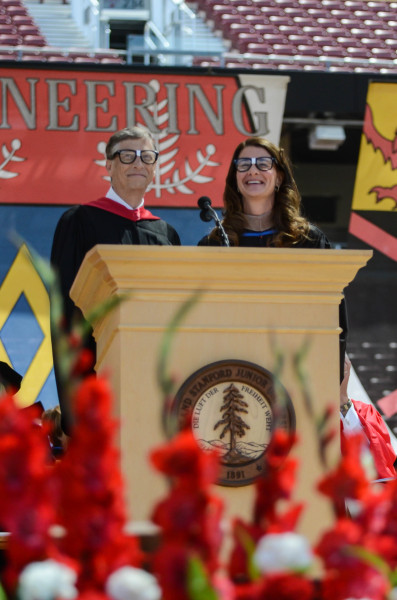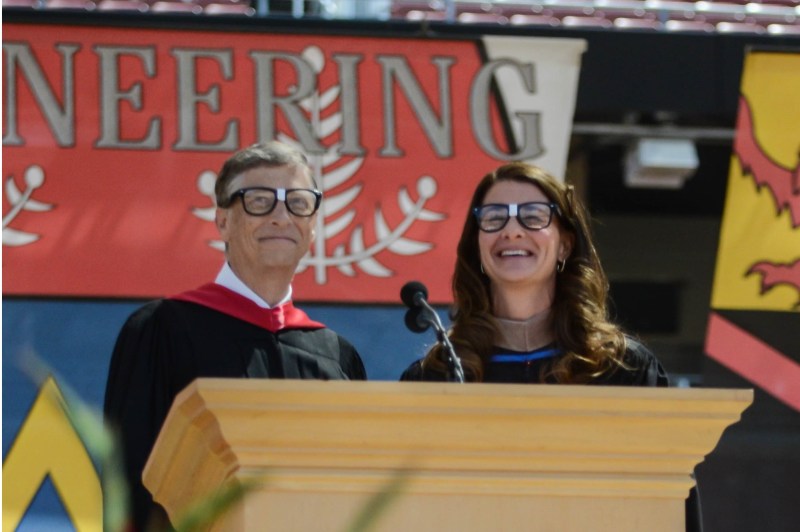
Bill and Melinda Gates shared the podium during Stanford’s first joint Commencement speech — touching upon innovation, optimism and empathy — to the Class of 2014 at Stanford’s 123rd Commencement ceremony.
But before the Gates went into their speech, they first donned what the Stanford community has adopted as a symbol of pride: Nerd Nation glasses.
“Some people call you all nerds, and we hear that you claim that label with pride,” Melinda said.
“Stanford is known for its creative and entrepreneurial spirit, and from its founding we have encouraged our students to use their education to promote the public good,” said University president John Hennessy. “Today’s speakers exemplify both these characteristics. Optimistic, bold, collaborative, focused, Bill and Melinda Gates believe every life has value, and over the past 14 years, through their foundation, they have been tackling society’s most complex problems.”
The Gates recounted their individual experiences when seeing suffering in less privileged communities across the globe.
Bill first emphasized the risk of worsening the digital divide with technological innovation, stating that the power technology provides should benefit everyone and that it should be equally accessible to all people.
Bill also spoke of his first trip to South Africa in 1997 when he had visited Soweto, a city just south of Johannesburg.
“I had seen statistics on poverty but I had never seen poverty,” Bill admitted, describing the destitute situation of the poor in Soweto. He recalled questioning his belief that innovation was the solution to tough global problems.
Bill gave the example of the multi-drug resistant tuberculosis (MDR-TB) situation when he returned to Soweto a number of years after his first visit to South Africa.
“Seeing this hell didn’t reduce my optimism,” he said. “It channeled it. I got into the car as I left and told the doctor we were working with, ‘I know MDR-TB is hard to cure, but we must do something for these people.’”
He cited improvements of the TB drug regime in the years since, resulting in an 80 percent cure rate after six months for under $100, compared to the previous 50 percent cure rate after 18 months of treatment that cost $2,000.
Melinda then spoke of her experiences when traveling in India 10 years ago, remembering the last day of her trip when she met with a group of prostitutes.
“I expected them to talk about the risk of AIDS that they were facing, but what they wanted to talk to me about was stigma,” Melinda said, describing that the sex workers were abandoned and not cared about by society.
Later that same day, Melinda encountered another example of the negative impact of societal stigma, when she visited a “home for the dying.” She had noticed one bed in the far off corner that wasn’t being attended to and went to comfort the 30-year-old patient that lay in it.
“And I could tell that [the patient] had AIDS, both in the way she looked and in the fact that she was off in this corner alone,” Melinda said.
Melinda then told the Commencement audience that even though she was unable to either cure the patient’s disease or alleviate the stigma that left the patient uncared for, she was able to fulfill the patient’s wish to see the sunset, taking her up to to the rooftop to face west by dusk.
Melinda described how for the past 10 years, the Gates Foundation has been helping sex workers build support groups. She commended how the women of these groups — although seen as the lowest in their communities — have initiated a change from the bottom up, noting that one factor that may have limited the AIDS epidemic in India was the self-empowerment of these women to ask clients to use condoms.
The Gates then addressed a paradox: that innovation could be seen as opening up new potential and making the world better, or that it could make inequality larger and decrease the next generation’s opportunities.
“If innovation is purely market-driven, and we don’t focus on the big inequities, then we could have amazing advances in inventions that leave the world even more divided,” Bill said. “If our optimism doesn’t address the problems that affect so many of our fellow human beings, then our optimism needs more empathy.”
Bill commended the Class of 2014 graduates, stating that he believed that the audience before him had a better sense of the world than he did when he was graduating college.
“Over the next generation, you Stanford graduates will lead the new wave of innovation,” Bill said. “If your world is wide, you can create the future we all want. If your world is narrow, you may create the future the pessimists fear.”
Melinda then spoke of how luck — where someone is born, when someone is born and what opportunities they are given — play such a large role in success.
“When we strip away our luck and privilege, and we consider where we’d be without them, it becomes much easier to see someone who’s poor and say, ‘That could be me.’ And that’s empathy,” Melinda said. “Empathy tears down barriers and opens up a whole new frontier for optimism.”
The Gates concluded their address to the Stanford graduates with uplifting final words of encouragement.
“As you leave Stanford, take all your genius and your optimism and your empathy, and go change the world in ways that will make millions of people optimistic,” Melinda said. “In the course of your lives, perhaps without any plan on your part, you’ll see suffering that’s going to break your heart. When it happens, don’t turn away from it. That’s the moment when change is born.”
George Chen contributed to this report.
Contact Catherine Zaw at czaw ‘at’ stanford.edu.
